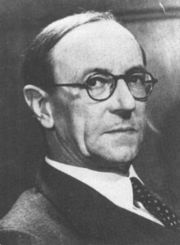|
"Fısıldanan sözlər çox kərə yüksək
səslə deyiləndən daha uzağa gedər"
Çin atalar sözü

James Chadwick
James Chadwick 1891-ci il oktyabrın 20-də İngiltərənin Cheshirə şəhərində anadan olmuşdur. James
milliyətcə
ingilisdir. Təhsilini Rutherford-un tələbəsi kimi Manchestər Universitetində aldı. 1919-cu ildə çalışmağa başladığı Cambridge Universitetində 1935-ci
ilə qədər oradakı işinə davam
etdi.
Əsas elmi işləri nüvə
fizikasının problemləri olmuşdur.
1923-cü ildə Cavendish
Laboratoriyasının Tədqiqatlar şöbəsinin müdürü vəzifəsinə
keçmişdir.
1927-ci ildə isə Royal Society-nin müxbir üzvü seçildi.
1932-ci ildə neytronu kəşf etdi və 3 il sonra bu kəşfinə görə 1935-ci ildə Nobel mükafatı
laureatı adına layiq görülmüşdür. Bundan başqa 1935-ci ildə Liverpool Universitetinin fizika kürsüsünə keçdi. İkinci Dünya Müharibəsi
dövründə Los Alamos-dakı atom tədqiqatlarına başçılıq etdi. 1948-ci ildə Cambridge-dəki bir kollecin müdürü vəzifəsinə
keçdi.
Deteryumun
qamma şüaları ilə parçalanmasını tədqiq edərək nüvə fotoelektrik effektini tapdı.
James Chadwick 24 iyul 1974-cü ildə Cambridge-də vəfat
etdi.
in english
James Chadwick
Sir
James Chadwick (October 20, 1891 – July 24, 1974) was an English physicist and Nobel laureate.Chadwick was born at Cheshire
the 20th of October 1891. He went to Manchester High School, (England) and studied at the Universities of Manchester and Cambridge.
His father was John Joseph Chadwick and his mother was Mary Anne Knowles.
In 1914 Chadwick went to work with Hans Geiger
at the Technische Hochschule in Berlin (today the Technical University of Berlin). He also worked with Lord Rutherford. During
the First World War Chadwick was interned in Germany as an enemy alien.
After the war Chadwick returned to Cambridge where
he worked with Ernest Rutherford in investigating the emission of gamma rays from radioactive materials. They also studied
the transmutation of elements by bombarding them with alpha particles, and investigated the nature of the atomic nucleus.
In
1932 Chadwick made a fundamental discovery in the domain of nuclear science: he discovered the particle in the nucleus of
an atom that became known as the neutron because it has no electric charge. In contrast with the helium nuclei (alpha particles)
which are positively charged, and therefore repelled by the considerable electrical forces present in the nuclei of heavy
atoms, this new tool in atomic disintegration need not overcome any electric barrier and is capable of penetrating and splitting
the nuclei of even the heaviest elements. In this way, Chadwick prepared the way towards the fission of uranium 235 and towards
the creation of the atomic bomb. For this epochal discovery he was awarded the Hughes Medal of the Royal Society in 1932,
and subsequently the Nobel Prize for Physics in 1935. Later, he found out that a German scientist had discovered the neutron
at the same time. But Hans Falkenhagen (Rostock) was afraid of publishing his results. When Chadwick learned of Falkenhagen's
discovery, he offered to share the Nobel Prize with him. Falkenhagen, however, modestly refused the honour.
Chadwick’s
discovery made it possible to create elements heavier than uranium in the laboratory. His discovery particularly inspired
Enrico Fermi, Italian physicist and Nobel laureate, to discover nuclear reactions brought by slowed neutrons, and led Lise
Meitner, Austrian physicist, to the discovery of “nuclear fission”, which triggered the development of an atomic
bomb..
He died in Cambridge the 24th of July 1974.
|

